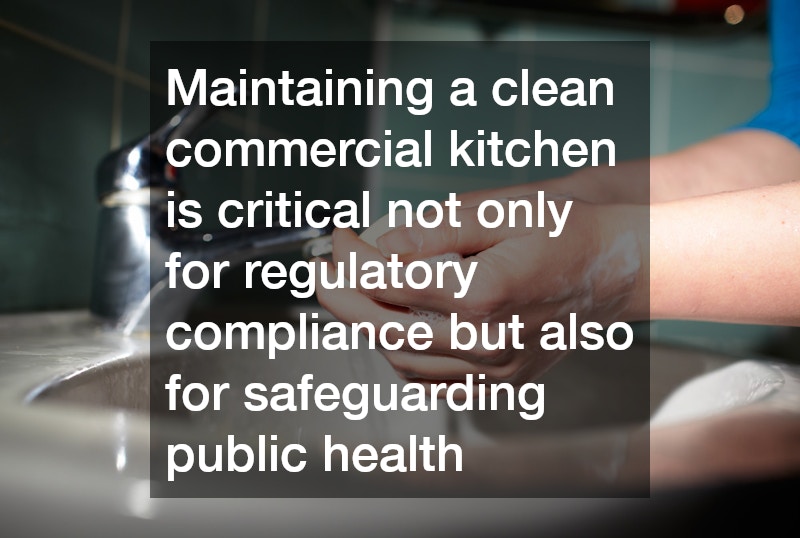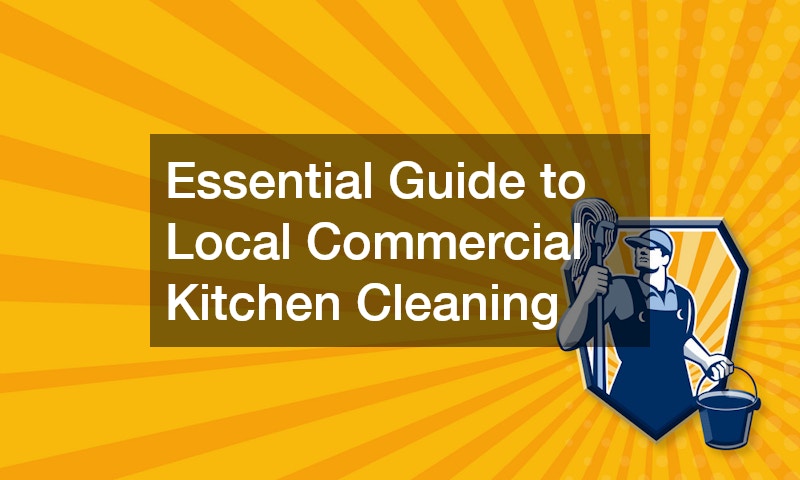Operating a commercial kitchen involves more than cooking and serving delectable dishes; it requires adhering to strict hygiene standards and maintaining a clean environment. The importance of kitchen cleanliness cannot be overstated, as it directly impacts the quality of the food and the health of your clientele. A dirty kitchen can lead to foodborne illnesses and attract pests, ultimately damaging your establishment’s reputation. Consequently, regular local commercial kitchen cleaning is vital to ensure compliance with health regulations and to create a sterile cooking environment. This guide offers practical tips to help you maintain high standards of cleanliness in your local commercial kitchen.
Understanding the Basics of Commercial Kitchen Cleaning
Commercial kitchen cleaning extends beyond mere surface cleaning; it encompasses a comprehensive approach that addresses every nook and cranny of the kitchen. Regularly degreasing surfaces, cleaning kitchen appliances, and ensuring proper waste disposal are fundamental tasks. It’s essential to use appropriate cleaning products that are effective yet safe for food preparation areas. Understanding the local health regulations is crucial as they often dictate specific standards that commercial kitchens must meet. Meeting these standards is not just about compliance; it’s about ensuring a safe dining experience for your customers.
The Importance of a Cleaning Schedule
A systematic cleaning schedule is imperative to maintain a spotless commercial kitchen. Implementing a daily, weekly, and monthly cleaning routine helps in managing tasks efficiently without overwhelming the staff. Daily cleaning should focus on sanitizing high-touch areas, while weekly and monthly schedules can include deep-cleaning tasks such as exhaust system maintenance and deep-fat fryer cleansing. Creating a checklist for each shift will ensure all tasks are completed consistently. Not only does this promote a culture of cleanliness among the staff, but it also reduces the risk of overlooking critical areas that may harbor harmful bacteria or pests.
Choosing the Right Cleaning Supplies
The effectiveness of your cleaning regimen heavily relies on the type of cleaning products and equipment you use. Choosing eco-friendly and food-safe cleaning products is paramount in maintaining a healthy kitchen environment. Products specifically designed for degreasing and disinfecting are essential, as kitchen surfaces are prone to grease buildup and bacterial contamination. Investing in high-quality cleaning tools, such as scrubbers and steam cleaners, can make the cleaning process more efficient and less labor-intensive. When selecting products, also consider their environmental impact and the potential to improve indoor air quality in your kitchen.
Staff Training and Hygiene Practices
Your staff plays a pivotal role in maintaining cleanliness; thus, training them on proper cleaning protocols is crucial. Educate your team on the importance of thorough cleaning and hygiene practices, emphasizing frequent handwashing and proper food handling techniques. Regular training sessions will keep your team updated on new cleaning products, techniques, and health regulations. Encouraging a culture of accountability will enhance adherence to cleaning schedules and ensure each team member understands their role in preventing contamination. This approach not only keeps the kitchen environment hygienic but also boosts overall team morale and productivity.
Outsourcing Commercial Kitchen Cleaning Services
Despite having a regular cleaning schedule, there are times when professional cleaning services are necessary. Outsourcing a commercial kitchen cleaning service can offer a deep clean that is sometimes difficult to achieve with in-house resources. Professional cleaners have specialized equipment and expertise to handle challenging cleaning tasks, such as duct cleaning or decontamination, that ensure compliance with stringent health codes. Hiring a professional service can be particularly advantageous during busy seasons or before health inspections. By outsourcing, you can ensure a thorough clean while allowing your staff to focus on their primary responsibilities.
Maintaining a clean commercial kitchen is critical not only for regulatory compliance but also for safeguarding public health and upholding your business’s reputation. Implementing a robust cleaning strategy that includes a detailed schedule, proper staff training, and the use of suitable cleaning products is key to achieving this goal. Understanding when to call in professional cleaning services can further enhance your kitchen’s hygiene standards. Remember, a clean kitchen is the cornerstone of a successful food business, inspiring confidence in your clientele and ensuring the continued success of your establishment. With diligent efforts and the right practices, your local commercial kitchen can continue to serve delicious meals in a clean and welcoming environment.
.


